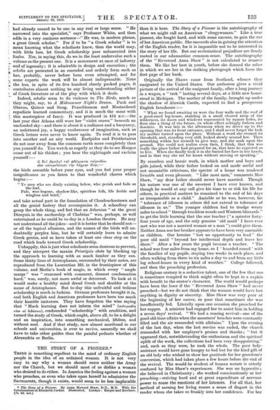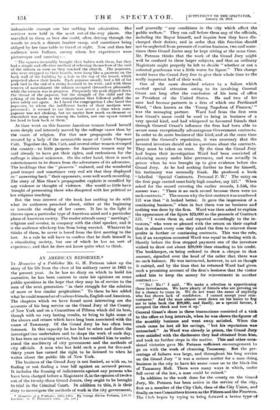THE STORY OF A PIONEER.*
THERE is something repellent to the mind of ordinary English people in the idea of an ordained woman. It is not very easy to say why a woman should enter neither the Army nor the Church, but we should most of us dislike a woman who desired to do either. In America the feeling against a woman who preaches, or even who takes upon herself to administer the Sacraments, though it exists, would seem to be less implacable • The Story of a Pioneer. By Anna Howard Shaw, D.D., M.D. With the Collaboration of Elizabeth Jordan. Illustrated. London : Harper and Brothers. [7s. ed. net.] than it is here. The Story of a Pioneer is the autobiography of what we might call an American " clergywoman." Like a true pioneer, she fought hard, and with some success, to gain the ear of her American public. She succeeds also in gaining the attention
of the English reader, for it is impossible not to be interested in the story of her life. But our ecclesiastical prejudices are firmly rooted in our adamantine common-sense. The autobiography of the " Reverend Anna Shaw " is not calculated to remove them. We like her best in youth, before she donned the robes in which we see her in the striking photograph which faces the first page of her book.
Originally the Shaws came from Scotland, whence they emigrated to the United States. Our authoress gives a vivid picture of the arrival of the emigrant family, after a long journey in a wagon, a " trek " lasting several days, at a little new home- stead in Michigan. The mother of the family, brought up under the shadow of Alnwick Castle, expected to find a prosperous English farmhouse :-
" What we found awaiting us were the four walls and the roof of a good-sized log-house, standing in a small cleared strip of the wilderness, its doors and windows represented by square holes, its floor also a thing of the future, its whole effect achingly forlorn and desolate. It was late in the afternoon when we drove up to the opening that was its front entrance, and I shall never forget the look my mother turned upon the place. Without a word she crossed its threshold, and, standing very still, looked slowly around her. Then something within her seemed to give way, and she sank upon the ground. She could not realize even then, I think, that this was really the place father had prepared for us, that here he expected us to live. When she finally took it in she buried her face in her hands, and in that way she sat for hours without moving or speaking."
By ceaseless and heroic work, in which mother and boys and girls joined, while their father looked on and made useful and
not unamiable criticisms, the spectre of a home was rendered liveable and even pleasant. " Like most men," comments Miss Shaw, " my dear father should never have married. Though his nature was one of the sweetest I have ever known, and though he would at any call give his time to or risk his life for others, in practical matters he remained to the end of his days as irresponsible as a child." Amiable as he was, however, his " tolerance of idleness in others did not extend to tolerance of idleness in us." The younger children had to trudge weary miles to school " through trackless woods and Western blizzards " to get the little learning that the one teacher (" a spinster forty- four years of age, and the only genuine ' old maid' I have ever met who was not a married woman or a man ") could give them. Neither Anna nor her brother appears to have been very amenable as children. Our heroine " lost no opportunity to lead " the poor old maid " beyond her intellectual depth and leave her there." After a few years the pupil became a teacher. " The school was four miles from my home, so I ' boarded round ' with
the families of my pupils, staying two weeks in each place, and often walking from three to six miles a day to and from my little log school-house in every kind of weather." College followed, and then the preaching profession.
Religious oratory is a seductive talent, one of the few that one is sometimes tempted to think might often be kept in a napkin with benefit to the orator's character. The world would perhaps have been the loser if the " Reverend Anna Shaw " had never preached—but we do not think that the woman would have lost anything in dignity or sincerity. Miss Shaw was very poor at the beginning of her career, so poor that sometimes she was insufficiently fed. Literally upon one occasion she preached for her supper. A minister had engaged her to assist him in holding a seven days' revival. " We had a rousing revival—one of the good old-time affairs when the mourners' benches were constantly filled and the air resounded with alleluias." Upon the evening of the last day, when the last service was ended, the church
resounded with her employer's praises and thanks ; " but it appeared that, notwithstanding the enthusiasm and the spiritual
uplift of the week, the collections had been very disappointing," and, such as they were, he took the whole. The poor lady- assistant would have gone hungry to bed but for the kind gift of an old lady who wished to show her gratitude for her grandson's conversion, which had taken place a few hours before the end of the revival. The would-be student of human nature is utterly confused by Miss Shaw's experiences. She was no hypocrite ; she believed in Christianity ; she worked conscientiously at her preaching—striving hard and at great expenditure of nervous
power to rouse the emotions of her listeners. For all that, her method of earning her living rouses a sense of disgust in the
reader whom she takes so frankly into her confidence. For her
indomitable courage one has• nothing but admiration. Her services. were held in the most out-of-the-way places. She travelled to them as best she' could; often driving• through the
woods to reach• a distant lumber camp, and sometimes being obliged by her time-table to travel at night Now and then her audience were Indians, among whom her experiences were picturesque and amusing :-
" The squaws invariably brought their babies with them, but they had a simple and effective method of relieving themselves-of the care of the infants as soon as they reached the church: The papooses, who were strapped to their boards, were hung like a garment on the back wall of the building by a hole in the top of the board, which projected above their heads. Eaeh papoose usually had a bit of fat pork tied to the end of a string fastened to its wrist, and with these sources of nourishment the infants occupied themselves pleasantly while the sermon was in progress. Frequently the pork slipped down the throat of the papoose, but the struggle of the child and the jerking of its hands in the strangulation that followed pulled the piece safely out again. As I faced- the congregation I also faced the papooses, to whom the indifferent backs of their mothers were presented ; it seemed to me there was never a time when some papoose was not ehoking-, but no matter how much excitement or discomfort was going on among the babies, not one squaw turned her head to look beck at them."
As time went on this famous American woman found herself more deeply and intensely moved• by the suffrage cause than by the cause of religion. For this new propaganda she was secured by a lady of the memorable name of Carrie Chapman Catt. Together she, Mrs. Catt, and several other women stumped the country—to little purpose—for American women may be said already to have got their rights, and enthusiasm for the suffrage is almost unknown. On the other hand, there is much entertainment to be drawn from the adventures of its advocates. The heeklings that the " pioneers " endured, and the wonderful good temper and sometimes very real wit that they displayed in-" answering back" their opponents, were well worth recording.
The story of Miss Shaw's propagandist exploits is unsullied by nay violence or thought of violence. She would as little have limught of persecuting those who- disagreed with her political as
her religious teaching.
But the true interest of the book has nothing to do with what its authoress preached about, either at the beginning or towards the ending of her career. It lies in the light it throws upon a partieular type of American mind and a particular phase of American society. The reader attends many " meetings," religious and secular, in company with the chief speaker, and it is the audience who keep him from being wearied. Whatever he thinks of them, he never is bored from the first meeting to the last. As a rule he will have to confess that he finds himself in a stimulating society, but one of which he has no- sort of experience, and that he does not know quite what to think.



















































 Previous page
Previous page